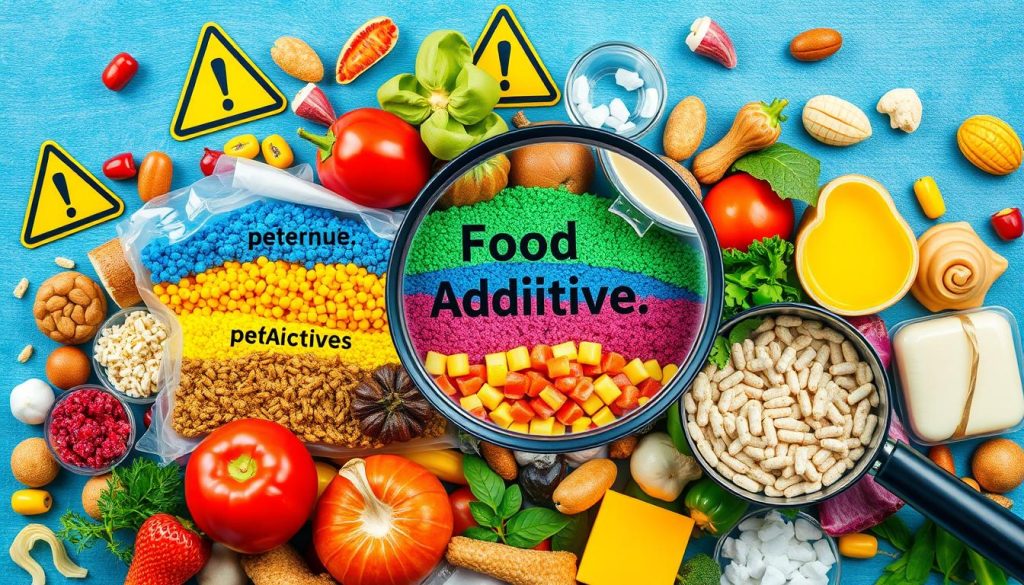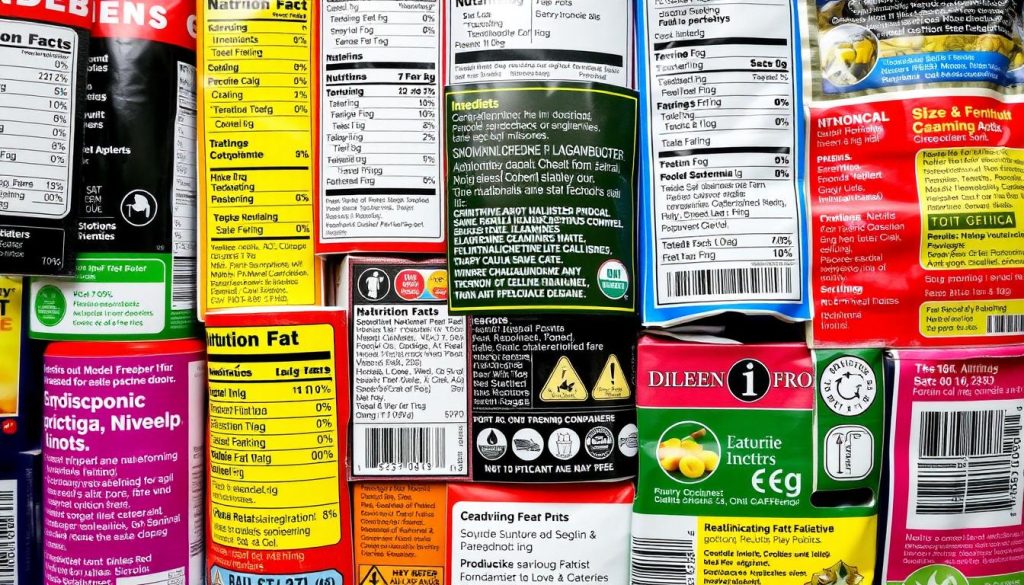Plato’s wisdom, “The first and greatest victory is to conquer yourself,” resonates deeply in our personal and dietary realms. In today’s fast-paced environment, where convenience often eclipses health, grasping the risks of unhealthy food is paramount. It profoundly affects our well-being.

Unhealthy food, commonly known as “junk food” or “processed food,” pervades our lives. From greasy fast-food burgers to sugary sodas, these items are calorie-dense yet nutrient-poor. They have become a staple in our daily lives, threatening our physical and mental health. It is imperative to confront this challenge and delve into the hidden dangers of our food choices.
Key Takeaways
- Unhealthy food can have serious consequences on our physical and mental well-being.
- Processed foods and fast food are often loaded with harmful ingredients like excess sugar, salt, and unhealthy fats.
- Consuming too much unhealthy food can lead to a range of chronic health issues, including obesity, heart disease, and diabetes.
- Understanding the dangers of unhealthy food is the first step towards making informed, healthier choices.
- Incorporating more whole, nutrient-dense foods into our diets can have a profound impact on our overall health and quality of life.
Understanding the Impact of Modern Food Choices
In today’s fast-paced world, the prevalence of processed foods and fast food has become a significant part of our daily lives. The food industry has undergone remarkable changes, shaping our eating habits and impacting our health in profound ways. It’s crucial to understand the implications of these modern food choices and their consequences.
The Rise of Processed Foods in Daily Life
Processed foods, with their convenient packaging, longer shelf life, and often lower prices, have become increasingly popular among consumers. From pre-packaged meals to sugary snacks, these highly processed items have infiltrated our homes and workplaces, making it challenging to maintain a healthy diet. The food industry’s emphasis on efficiency and profitability has led to the widespread availability of these processed foods, often at the expense of nutritional value.
How Food Industry Changes Affect Our Health
The food industry’s pursuit of cost-cutting measures and increased profit margins has had a significant impact on public health. The use of artificial preservatives, additives, and high-calorie ingredients in processed foods has been linked to a range of health consequences, including obesity, heart disease, and diabetes. As these unhealthy foods become more accessible, the risk of developing chronic conditions continues to rise, posing a serious challenge to individual and societal well-being.

“The food industry has become a significant contributor to the rise of many health problems, and it’s crucial that we understand the implications of our food choices.”
Ultimately, the widespread availability of processed and fast food has profoundly influenced our dietary habits, often leading to the consumption of foods that are high in unhealthy fats, sugars, and calories. Understanding the impact of these modern food choices is the first step towards making more informed decisions and improving our overall health and well-being.
What Makes Food Unhealthy: Key Components
Understanding the unhealthy aspects of certain foods involves examining several critical elements. The presence of high-calorie and high-fat content is a major concern. Many processed and fast foods are rich in unhealthy fats, contributing to weight gain and increasing the risk of heart disease.
Another critical issue is the high sodium levels in many packaged and restaurant meals. Excessive sodium intake can elevate blood pressure, a significant risk factor for cardiovascular diseases. These nutrient-poor, high-sodium foods offer “empty calories,” lacking the essential vitamins, minerals, and fiber our bodies need.
Recognizing these high-calorie, high-fat, and high-sodium components is vital for making informed food choices. By being aware of these factors, we can enhance our dietary habits and mitigate health risks associated with unhealthy foods.

“The quality of the calories we consume is just as important as the quantity.”
In conclusion, adopting a balanced, nutrient-dense diet that restricts high-calorie, high-fat, and high-sodium items is crucial for maintaining optimal health and well-being.
The Hidden Dangers of Fast Food Consumption
In today’s fast-paced world, fast food has become a staple in many diets. Beyond convenience and appealing flavors, hidden dangers exist. These include harmful preservatives and excessive portion sizes. Understanding these risks is crucial for making informed choices.
Chemical Additives and Preservatives
Fast food items often contain chemical additives and preservatives. These are designed to extend shelf life and enhance flavor. Compounds like artificial colors, flavors, and sweeteners have been linked to health concerns. These include allergic reactions, behavioral issues, and even cancer. Regular consumption of fast food exposes us to a cocktail of harmful preservatives, posing a risk to our well-being.
Excessive Calories and Portion Distortion
Fast food establishments serve oversized portions, often exceeding daily calorie, fat, and sodium intake. This portion distortion can lead to weight gain, obesity, and various health problems. These include heart disease, diabetes, and high blood pressure. Recognizing and resisting these excessive calories is essential for a balanced diet.
Trans Fats and Artificial Ingredients
Many fast food items contain trans fats and artificial ingredients. These can have dire consequences for our health. Trans fats, for instance, raise bad cholesterol (LDL) levels and lower good cholesterol (HDL), increasing heart disease risk. Additionally, artificial ingredients can disrupt our body’s natural processes. This can lead to digestive issues and hormonal imbalances.
Navigating the fast food dangers requires awareness and vigilance. By understanding the hidden risks of chemical additives, excessive calories, and artificial ingredients, we can make informed choices. This prioritizes our long-term health and well-being.

“The more you know about the potentially harmful effects of fast food, the more empowered you’ll be to make healthier choices for yourself and your family.”
High-Sugar Foods and Their Effects on the Body
In today’s fast-paced world, the prevalence of sugar-filled foods in diets is undeniable. From sugary sodas and candy bars to refined carbohydrates like white bread and pastries, these foods significantly impact our health. It is essential to understand the risks of sugar and how certain foods can raise blood sugar levels. This knowledge is crucial for making informed dietary choices.
Consuming excessive amounts of refined sugar foods challenges our bodies to regulate blood sugar levels. This can result in weight gain, insulin resistance, and an elevated risk of type 2 diabetes. Moreover, high sugar intake is associated with inflammation, which can exacerbate cardiovascular disease and other chronic conditions.
- Excess sugar consumption can disrupt the body’s metabolism and lead to weight gain.
- High sugar levels in the blood can increase the risk of insulin resistance and type 2 diabetes.
- Consuming too many sugar-filled foods can contribute to inflammation, which is a contributing factor in various chronic diseases.
“Moderation is key when it comes to sugar intake. Incorporating more whole, unprocessed foods into your diet can help regulate blood sugar levels and support overall health.”
By being mindful of our sugar consumption and opting for healthier, low-sugar alternatives, we can significantly improve our physical and mental well-being. Remember, small changes in our dietary habits can have a profound impact on our long-term health and quality of life.

The Link Between Processed Foods and Chronic Diseases
Modern diets heavily rely on processed and convenience foods, posing serious health risks. These foods are closely associated with heart disease and diabetes, two chronic conditions. The consumption of heart disease and food, unhealthy food for heart health significantly impacts our health.
Heart Disease and Blood Pressure Concerns
Processed foods, especially those high in sodium and unhealthy food, can lead to cardiovascular issues. They often contain excessive salt, causing elevated blood pressure. This is a major risk factor for heart disease. Moreover, the saturated and trans fats in these foods can harm cholesterol levels, raising the risk of heart attacks and strokes.
Diabetes Risk Factors
Processed foods also increase the risk of food and diabetes. They are often high in added sugars, disrupting insulin regulation and potentially leading to type 2 diabetes. Regular consumption of these unhealthy food for heart health significantly raises the risk of developing this condition.
Recognizing the link between processed food and chronic diseases is vital for healthier choices. By reducing heart disease and food intake and opting for whole, nutrient-dense foods, we can lower these risks. This approach protects our overall health.

“The more processed a food is, the more likely it is to contribute to chronic diseases like heart disease and diabetes.”
Understanding Unhealthy Food and Weight Gain
For many, the struggle to maintain a healthy weight is ongoing, often due to our daily food selections. Obesity, a rapidly increasing issue, is directly tied to excessive consumption of unhealthy foods. These “fattening foods” significantly impact our waistlines, contributing to weight gain and the buildup of belly fat.
The rise in processed and fast foods in our diets is a major factor in weight gain. These items, rich in calories, sugar, and unhealthy fats, can upset our body’s natural hunger and fullness signals. This leads to consuming more calories than our bodies can burn, causing weight to increase gradually over time.
- Foods high in added sugars, such as sodas, candies, and baked goods, can contribute to weight gain and the development of belly fat.
- Fried foods and high-fat snacks are also common culprits, as they are dense in calories and lack the nutritional value to keep us feeling full and satisfied.
- Processed meats, like bacon and sausage, and refined carbohydrates, such as white bread and pasta, can also play a role in weight gain and the accumulation of abdominal fat.
Switching to a more balanced and nutritious diet, focusing on whole, unprocessed foods, is a crucial step towards maintaining a healthy weight and reducing obesity-related risks. Recognizing the link between unhealthy food choices and weight gain empowers individuals to make better dietary decisions. This, in turn, enhances overall health and well-being.
“The secret of getting ahead is getting started.” – Mark Twain

How Junk Food Affects Mental Health
The intricate relationship between food and mental health is a topic of paramount importance. Studies have underscored the profound impact of unhealthy food choices, especially junk food, on our mental well-being. These effects span from depression and anxiety to cognitive function, highlighting the far-reaching consequences of poor dietary habits.
Depression and Anxiety Connections
Recent research indicates a robust correlation between junk food consumption and the heightened risk of mental health disorders such as depression and anxiety. The high sugar, unhealthy fats, and processed ingredients in junk food can upset the body’s hormonal equilibrium and induce chronic inflammation. Both factors are known to worsen mental health conditions.
Impact on Cognitive Function
Junk food’s influence extends beyond emotional and psychological realms, affecting cognitive function significantly. A diet dominated by unhealthy foods is linked to diminished memory, reduced attention span, and a decline in brain health. The absence of vital nutrients and the presence of harmful additives in junk food impede the brain’s optimal functioning. This can result in decreased productivity and a diminished quality of life.
Adopting a balanced, nutrient-rich diet is essential for supporting both physical and mental health. By choosing to reduce junk food intake and focus on whole, unprocessed foods, individuals can significantly enhance their mental health and cognitive abilities.

“The food you eat can be either the safest and most powerful form of medicine or the slowest form of poison.” – Ann Wigmore
The Truth About Food Additives and Preservatives
In the realm of processed foods, additives and preservatives have become a focal point for health-conscious consumers. These chemical compounds are added to enhance shelf life, flavor, or texture. However, their potential impact on our well-being is significant and cannot be overlooked.
Many harmful preservatives and chemical additives in processed food have been linked to health issues, from allergic reactions to chronic diseases. It is essential to understand the truth behind these additives to make informed choices and protect our health.
Decoding Food Additives
Food additives encompass a wide range, including artificial sweeteners, coloring agents, emulsifiers, and flavor enhancers. While some may be deemed safe in small amounts, the cumulative effect of consuming multiple chemical additives is concerning. Reading food labels carefully and familiarizing oneself with potential risks is crucial.
- Artificial preservatives, such as BHA and BHT, have been linked to hormone disruption and cancer.
- Artificial sweeteners, like aspartame, have been associated with neurological issues and increased risk of metabolic disorders.
- Monosodium glutamate (MSG) is a flavor enhancer that has been known to cause headaches and other adverse reactions in some individuals.
“Consuming a diet high in processed food dangers can have significant consequences on our health, from weight gain to chronic diseases. It’s crucial to be aware of the hidden dangers lurking in our food choices.”

Preservatives and Shelf Life
Food additives primarily serve to extend the shelf life of processed foods. While this may seem beneficial, it comes at the cost of potential harmful preservatives accumulating in our bodies. These preservatives can disrupt natural bodily functions and contribute to various health issues.
- Butylated hydroxyanisole (BHA) and butylated hydroxytoluene (BHT) are common preservatives that have been linked to cancer and hormone disruption.
- Sodium nitrite, used to preserve meats, has been associated with an increased risk of stomach cancer.
- Potassium bromate, found in some breads and baked goods, is a suspected carcinogen.
By grasping the truth about food additives and preservatives, we can make more informed decisions. Prioritizing whole, minimally processed foods is a simple yet impactful step towards a healthier lifestyle.
Impact of Unhealthy Food on Children’s Development
The food we select for our children profoundly influences their growth, learning, and overall health. Consuming unhealthy food, characterized by excessive sugar, salt, and unhealthy fats, poses significant risks to their physical and cognitive development.
Learning and Behavior Issues
Research indicates a clear link between unhealthy food intake and learning challenges in children. Diets heavy in processed foods and added sugars are associated with attention deficit hyperactivity disorder (ADHD) and other behavioral issues. These can impede a child’s capacity to concentrate and learn effectively in school.
Growth and Development Concerns
Proper nutrition is vital for children’s physical growth and development. Yet, a diet dominated by unhealthy food and child development can result in stunted growth, obesity, and nutritional deficiencies. These issues not only compromise a child’s physical health but also their self-esteem and confidence.
“A growing body of research suggests that the food and learning connection is more significant than we once thought. Ensuring our children have access to children’s nutrition that supports their development is crucial for their long-term success.”
As parents and caregivers, it is imperative to consider the impact of our food choices on our children’s development. By focusing on healthy food and child development, we can empower our children for academic success and overall well-being.

Long-term Effects of Poor Dietary Choices
The effects of a diet rich in unhealthy foods can be profound, impacting your long-term health significantly. Consuming such foods can elevate your risk of cancer and even damage your kidneys. It’s crucial to adopt healthier eating habits to mitigate these risks.
One of the most concerning outcomes of an unhealthy diet is the increased risk of certain cancers. Research indicates a strong link between the consumption of processed and high-fat foods and a higher chance of developing cancers like colorectal, breast, and prostate. This highlights the need to include more plant-based, nutrient-rich foods in your diet.
Moreover, an unhealthy diet can severely affect your kidneys. The excessive consumption of sodium, unhealthy fats, and sugars can strain these vital organs. This strain may lead to kidney dysfunction and chronic kidney disease over time. Adopting a balanced diet and reducing intake of harmful substances can protect your kidney health.
“The choices you make today will determine the quality of your life tomorrow.”
The long-term effects of poor dietary choices are far-reaching, influencing your risk of chronic diseases and overall quality of life. By making informed food choices and focusing on a balanced, nutrient-rich diet, you can proactively protect your health. This ensures a brighter, healthier future for you.

Understanding Food Labels and Hidden Dangers
Exploring the realm of food labels can be a daunting task for those prioritizing health. Despite their purpose of offering crucial information, manufacturers often manipulate these labels to make false claims. By grasping the nuances of food labels and nutrition facts, you can make informed choices and evade deceptive marketing strategies.
Decoding Nutrition Facts
The nutrition facts panel on food labels serves as a vital tool for gauging a product’s nutritional content. It is essential to focus on the serving size, calorie count, and key nutrients such as sugar, sodium, and fat. Be cautious of products with excessive added sugars, saturated fats, and sodium, as these can lead to various health problems.
Common Misleading Claims
Food companies frequently employ deceptive labeling to enhance the perceived healthiness of their products. Terms like “natural,” “low-fat,” or “reduced-calorie” can be misleading, as they do not accurately reflect the product’s nutritional value. It is crucial to scrutinize food labels and nutrition facts to avoid falling prey to misleading food claims.
- Be cautious of hidden sugars, such as those labeled as “evaporated cane juice” or “high-fructose corn syrup.”
- Question “low-fat” or “fat-free” claims, as these products may contain high amounts of added sugars or unhealthy ingredients.
- Remember that “organic” or “all-natural” does not automatically mean a product is healthier, as it may still be high in calories, sugar, or unhealthy fats.
By comprehending the complexities of food labels and nutrition facts, you can confidently navigate the supermarket and make choices that support your health goals. This approach helps you avoid the pitfalls of misleading food claims.

Conclusion
In this article, we’ve delved into the significant impact of unhealthy food choices and the hidden dangers in our modern food environment. The rise of processed foods and the detrimental effects of fast food and high-sugar diets are stark reminders of the consequences of our eating habits. These choices can have profound effects on our long-term health and well-being.
Fortunately, by making informed decisions and adopting healthier eating habits, we can take charge of our health. This approach significantly reduces the risks associated with unhealthy foods. By learning to read food labels, avoiding harmful additives and preservatives, and choosing whole, nutrient-dense foods, we can nourish our bodies. This supports our overall wellness.
Transitioning to a healthier diet may seem challenging, but the long-term benefits are substantial. By focusing on healthy eating habits and incorporating diet tips for health, we can lower our risk of chronic diseases. This also improves our mental state and ensures optimal growth and development, especially for our children. Remember, while the foods to avoid for better health may be tempting, making the right choices today paves the way for a brighter, healthier future.
FAQ
What are the main components that make food unhealthy?
Unhealthy foods are characterized by high-calorie content, excessive unhealthy fats, and high sodium levels. They lack essential nutrients, earning them the label of “empty calories.” These foods provide energy without offering any real nutritional value.
What are the hidden dangers of fast food consumption?
Fast food contains harmful chemical additives, preservatives, and artificial ingredients. It is also high in calories, unhealthy fats, and large portion sizes. These factors can lead to weight gain, heart disease, and other chronic conditions.
How do high-sugar foods affect the body?
High-sugar foods can cause blood sugar spikes, increase diabetes risk, and contribute to weight gain. They can also damage organs like the liver. It’s essential to control sugar intake for health maintenance.
What is the link between processed foods and chronic diseases?
Processed foods are linked to chronic diseases such as heart disease, high blood pressure, and diabetes. Their high levels of unhealthy fats, sodium, and lack of nutrients contribute to these health issues over time.
How does unhealthy food affect weight gain and obesity?
Unhealthy, calorie-dense foods high in fat and sugar can cause weight gain and belly fat accumulation, leading to obesity. This increases the risk of chronic diseases like heart disease and diabetes.
How does junk food impact mental health?
A diet rich in junk food can negatively affect mental health, increasing depression and anxiety risks, and impairing cognitive function. The poor nutritional value of these foods may contribute to these effects.
What are the long-term effects of consistently consuming unhealthy foods?
Regularly choosing unhealthy foods can lead to serious health consequences, including cancer, kidney damage, and chronic conditions. It’s vital to improve dietary habits for overall well-being.
How can I identify and avoid hidden dangers in food labels and marketing claims?
Reading food labels and nutrition facts carefully can help identify hidden dangers like excessive sugar, sodium, or unhealthy fats. Be cautious of misleading marketing claims. Opt for whole, minimally processed foods for healthier choices.






